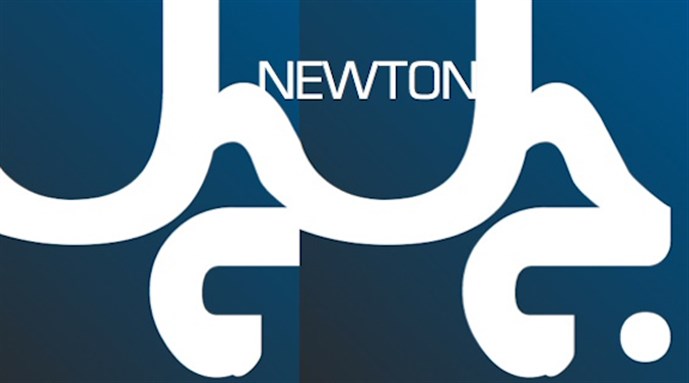Mike de Seve and Daniel Burwen, Operation Ajax: The Story of the CIA Coup that Remade the Middle East. Foreword by Stephen Kinzer. London and New York: Verso, 2015.
Jadaliyya (J): What made you write this book?
Mike de Seve (MdS): Well, being an American gets stranger the more you know about our covert history. Having grown up in a time and place where America stood for peace and democracy, and Iran was considered the devil (in my town, Khomeini dart boards were a big seller) I was fascinated to find out some of the historical factors that put such an extremist regime in power, and to see the United States’ own fingerprints all over that history. Then, once you learn of Iran’s fledgling democracy and the US engineering its overthrow just a couple of decades before Khomeini, it’s not hard to connect the dots from that coup up to 1979, and then to the present day.
Daniel Burwen (DB): The inspiration came from originally wanting to prevent unnecessary war with Iran, after feeling disgust and frustration with the Iraq war in 2002.
I discovered Overthrow by Stephen Kinzer in 2007, and immediately felt like I had found the missing stories that I had hoped Americans would have had in their minds when the Iraq war was about to start. I approached Stephen at a book signing in early 2008, and when he said yes, our fates were sealed.
J: What particular topics and issues does the book address?
MdS: Iran gaining its independence from colonist Britain, the nationalizing of its oil by Mohammad Mossadegh, and then the MI5/CIA overthrow of him. I felt this is a story Americans deserve to know and Iranians deserve to have told, and I wanted to help do that—even more so because it’s the beginning of the story of our global addiction to oil, which grips us so severely today and is destroying the climate.
DB: In short, the overthrow of Iran’s government by the CIA; in a wider context, the implications of US foreign policy over the past one hundred years, and how the relationships of various sovereign nations with the US have been affected by these decisions our government makes on behalf of its citizens.
J: How does this book connect to and/or depart from previous work you have done?
DB: I had never done a graphic novel before. I come primarily from video game development, so this was a complete departure. I also had never done narrative work, produced comics, created new interaction paradigms for touch devices, published an app, managed a creative team, or supervised such an immense project.
MdS: It’s not funny. I guess it’s pretty funny to for me to write something so not-funny, especially in a medium called “comics.” What it has in common is that in creating it, we worked very hard to make it damn entertaining. I hope we succeeded! The history itself helps. It starts out intriguing, and ends up quite a wild ride.
J: Who do you hope will read this book, and what sort of impact would you like it to have?
DB: I hope young Americans read it and bear the lessons in mind when they become voting age. I want this story to be part of the default dogma when Americans think of Iran. I want this book to be in classrooms.
MdS: I’d like anyone who wants peace in the Middle East to read this book. It’s not so threatening—being both a “comic book” and also about figures who are now all dead. But this period of history holds so many keys to understanding the roots of Middle East-Western conflict. If more people knew how we got here, and what role big business—particularly the oil industry—played in putting us here, they wouldn’t believe so much propaganda that the hawks are spewing on both sides. They’d see behind the curtain a bit more. At least that’s my hope.
J: What other projects are you working on now?
MdS: Getting the feature film version of Operation Ajax financed, for one, with partners Boomgen Studios—that’s Reza Aslan and Mahyad Toussi’s company.
DB: I currently work for a Virtual Reality company called Jaunt, so they get pretty much all of my attention these days. I am hoping to take my background crafting new forms of storytelling to help make VR a meaningful and enduring medium.
J: How do you think this book might be received at this particular moment, given the extent to which the relationship between Iran and the United States is in the news?
DB: That’s a tough one. I for now have not been following the history as closely as I would like to. But at the same time, I think the lessons of Ajax are timeless, and continue to be relevant in the dialogue with Iran. My hope is that Iran in the news makes people curious, and that curiosity leads them down paths of discovery, of which this book is a branch.
MdS: I think huge numbers of Americans are looking for answers. Many now doubt that Iran and the US need to be such enemies. There is still a lot of distrust, though. I always feel that the only way to find peace between any two entities, governmental or individual, is for both sides to hear and accept the other’s side of the story. This book tries to tell those sides—hopefully this will be an eye-opener for those who suspect things can be better.
J: Why a graphic novel?
MdS: The graphic novel is a great new art form—it can give you all the excitement of a feature film (for a tiny fraction of the budget) and also pack in a lot more factual information. For all the entertainment value of Argo, a feature film doesn’t actually let you get that much information across. This medium lets us have a thrilling story with a hell of a climax and a couple of really cool twists—and also really tell a substantial amount of the history.
Coming from DreamWorks, working on movies like Madagascar and Monsters vs. Aliens taught me a lot about finding the perspective in a story that the audience can invest in. That was a key to making this story work: finding who the protagonist should be—someone we can care about, invest in the stakes of. A graphic novel let us apply those same techniques, to give a really personal and, hopefully, gripping point of view about an important part of world history.
J: You created an award-winning app for Operation Ajax. Why do a print book as well?
DB: The unfortunate truth with digital media is that we just don`t value it the way we do things that are gated, like physical printed books. I struggle to get people to pay five dollars for the app, but ask someone interested in the project to plunk down twenty-five dollars for a physical copy and they are happy to do it. The flip side is that the app has been downloaded over one hundred thousand times all over the world. I`d be happy if we sold ten thousand copies of the physical book.
Also, given its origins in comics, I think the book truly lives a different life in print. I hope it helps bring the project legitimacy.
Excerpts from Operation Ajax: The Story of the CIA Coup that Remade the Middle East
.jpg)
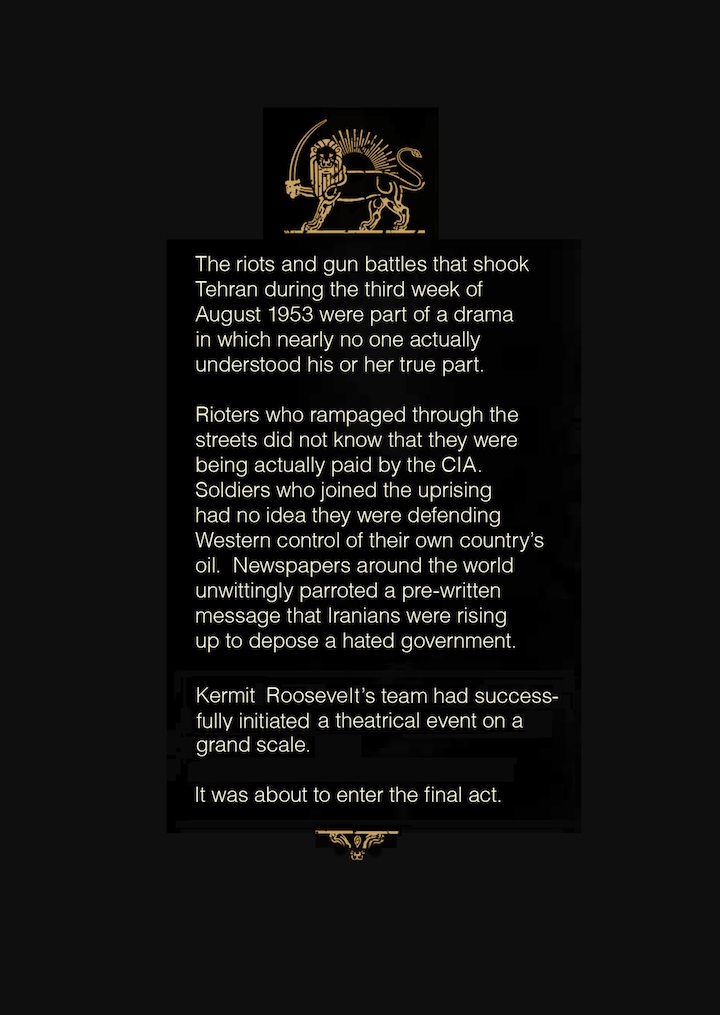
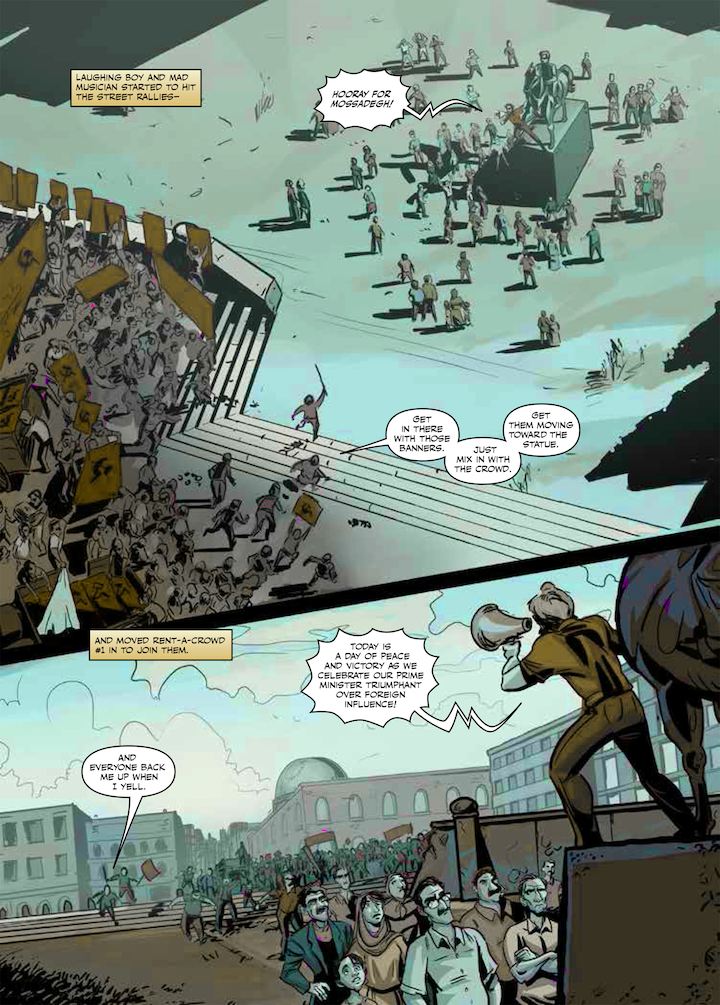
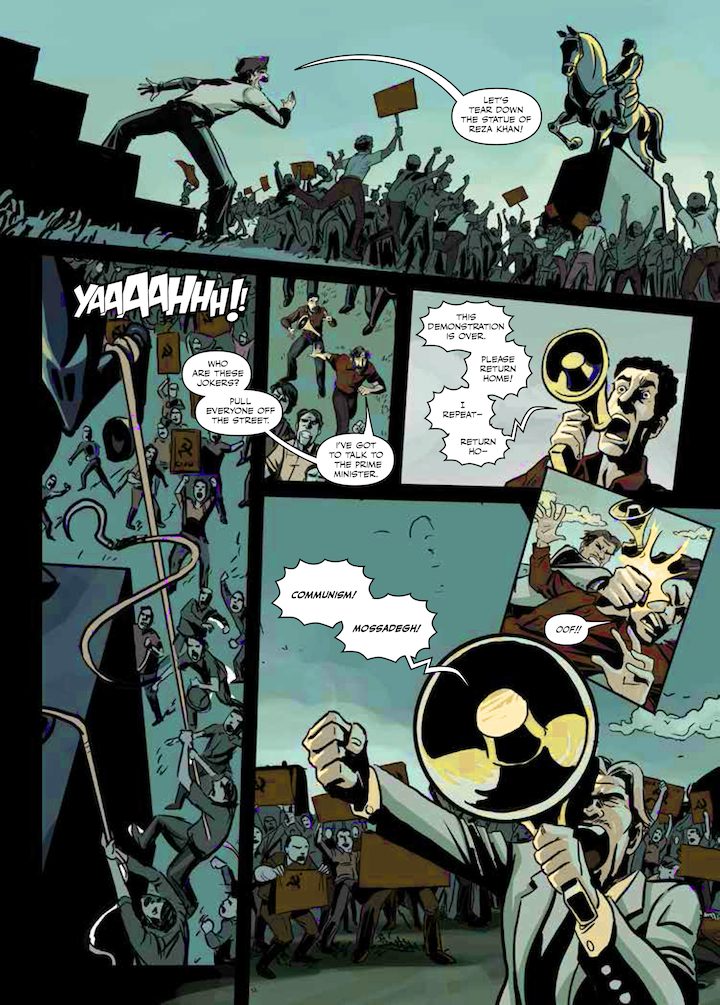
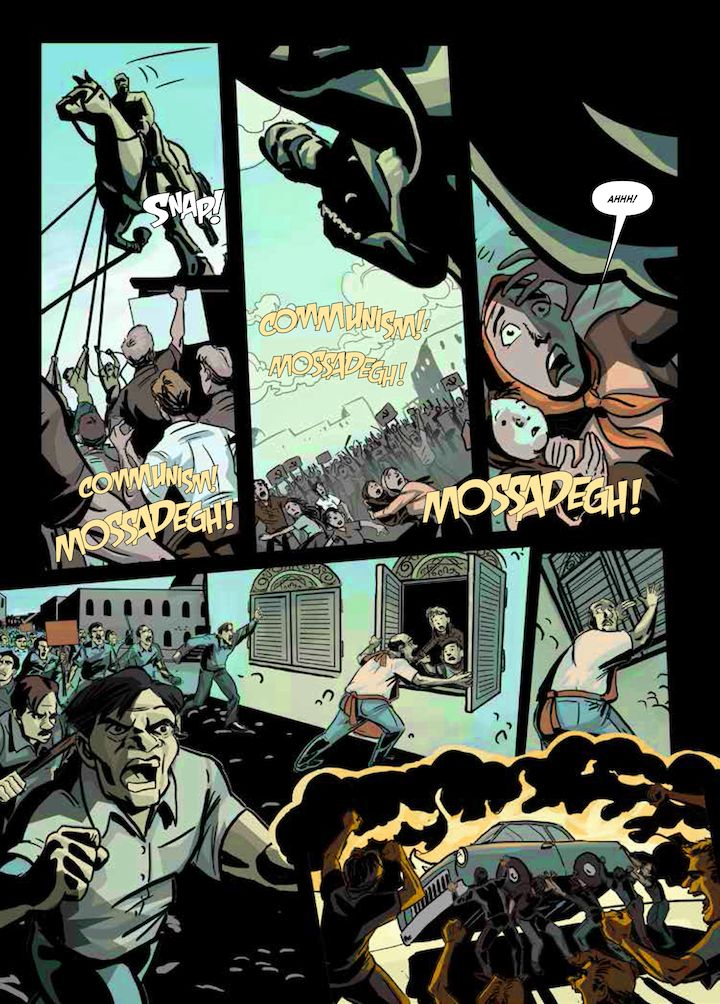
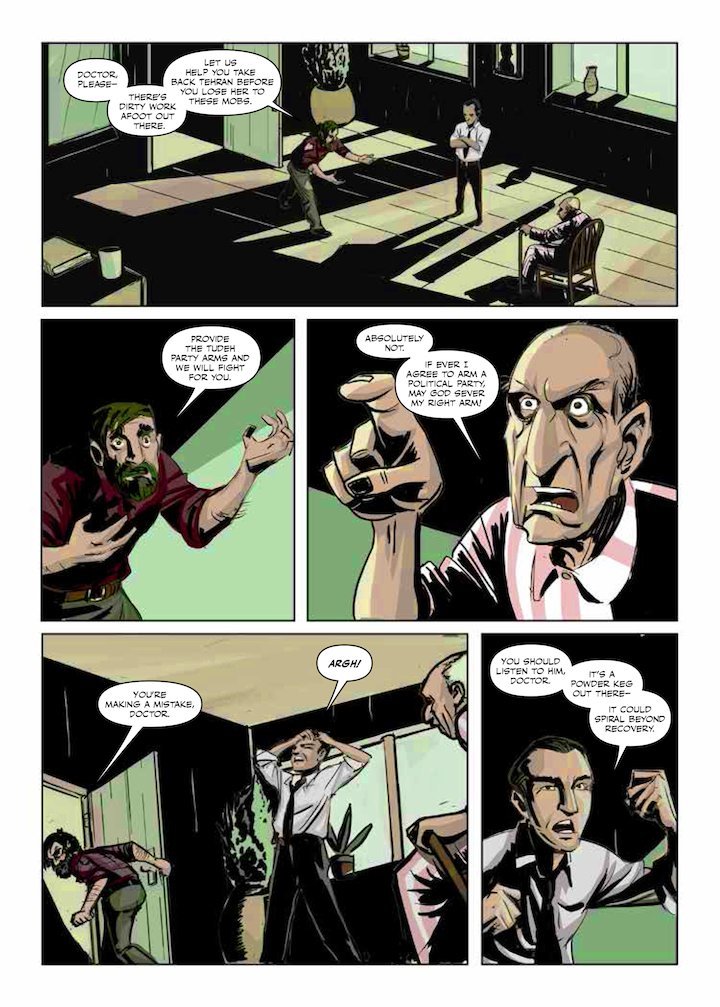
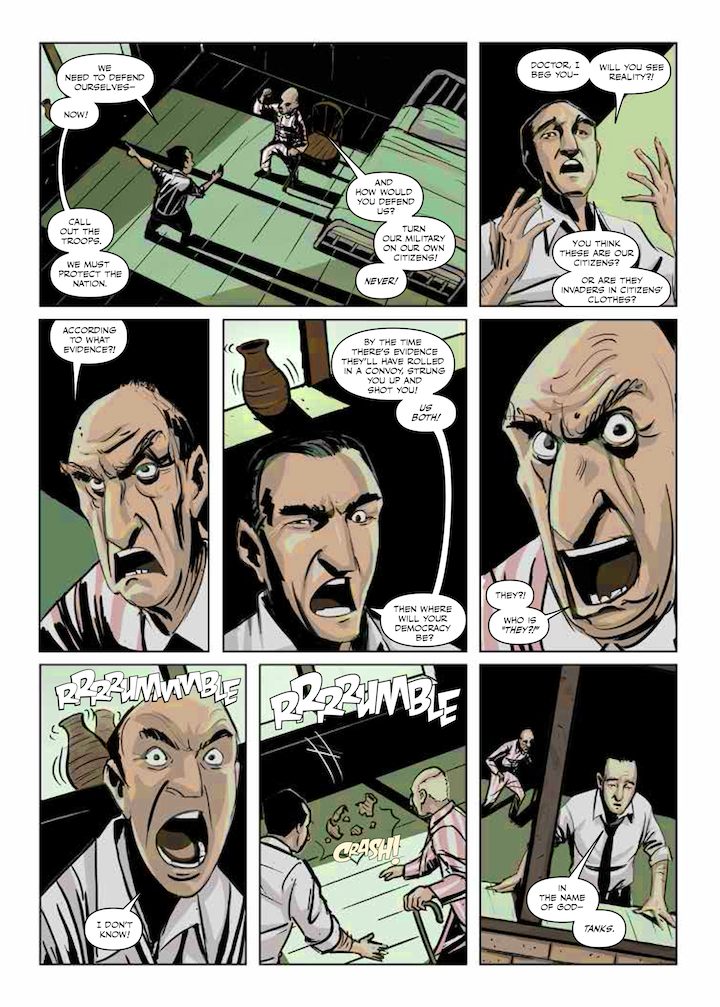
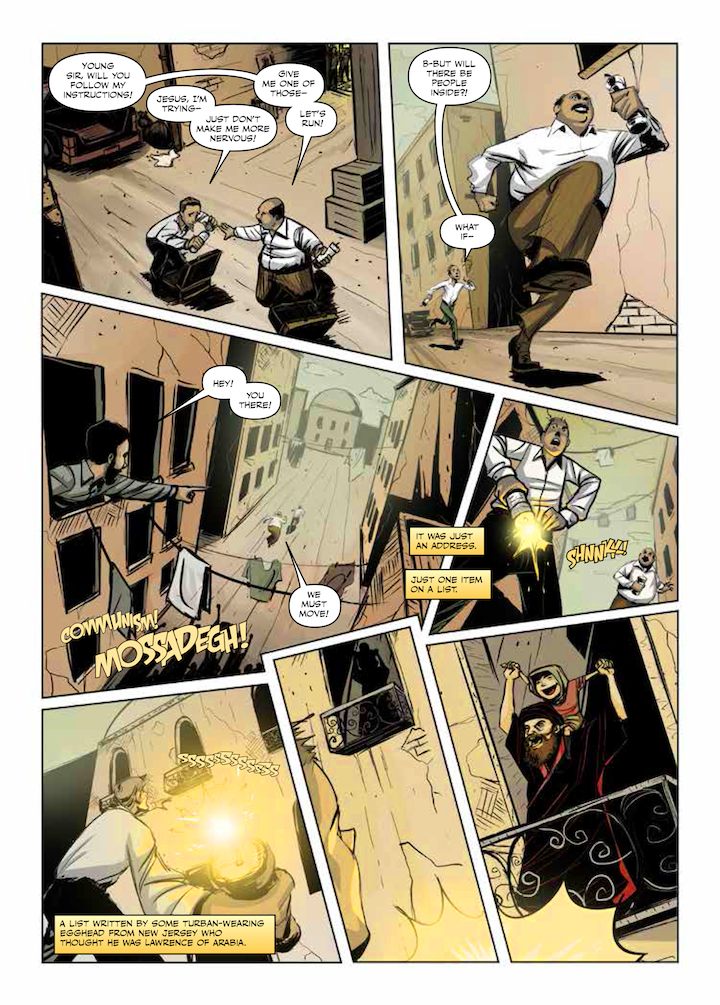
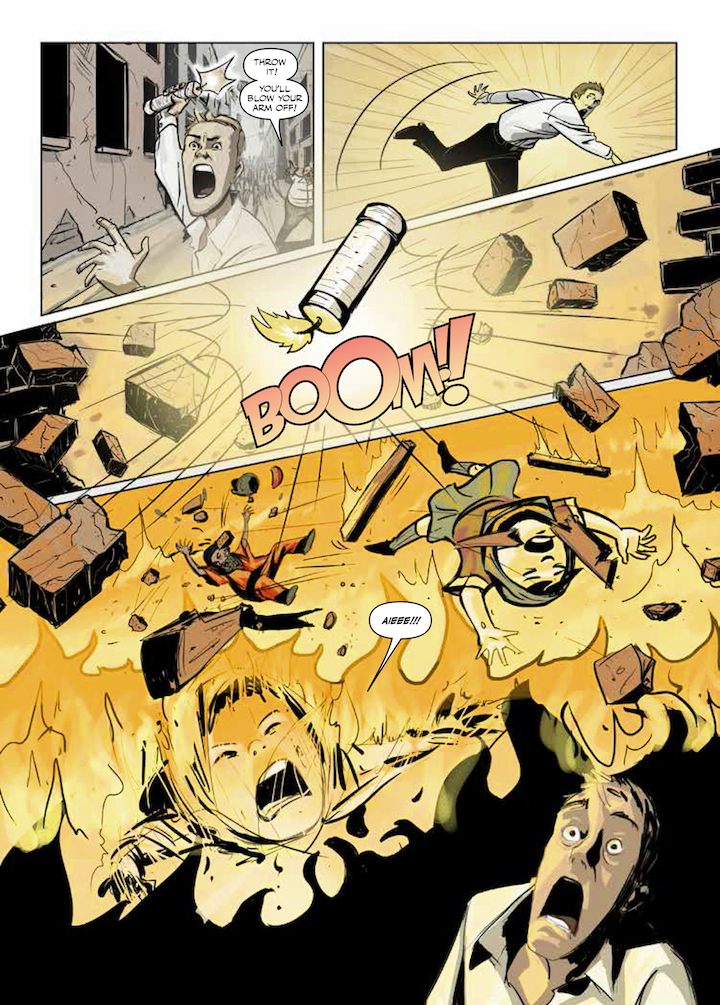
[Excerpted from Operation Ajax: The Story of the CIA Coup that Remade the Middle East, by Mike de Seve and Daniel Burwen, by permission of the authors. Text © Mike de Seve 2015; illustrations © 2015 Daniel Burwen. For more information, or to purchase this book, click here.]
![[Cover of Mike de Seve and Daniel Burwen, \"Operation Ajax: The Story of the CIA Coup that Remade the Middle East\"]](https://kms.jadaliyya.com/Images/357x383xo/Operation_Ajaz_cover.jpg)






